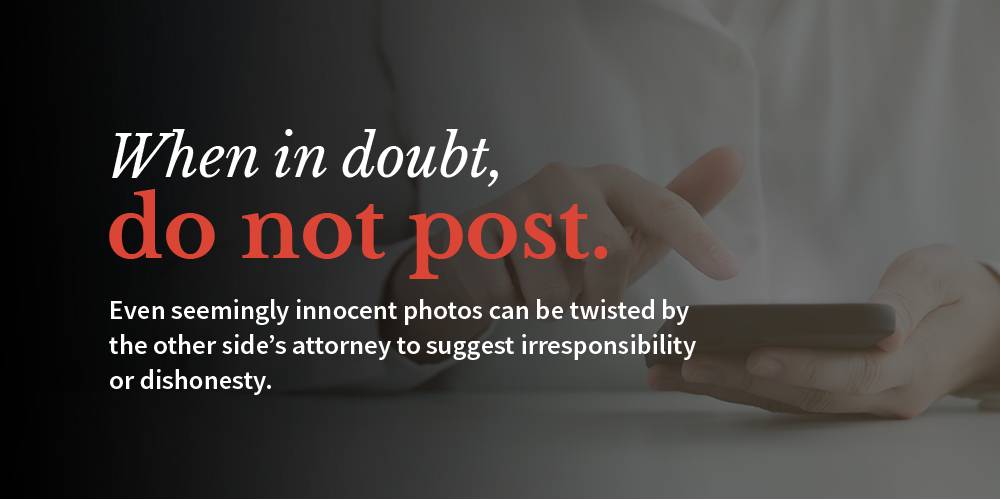Can My Ex Use My Social Media Against Me in Court?
 Divorce can make every detail of your personal life feel like you’re under a magnifying glass. In today’s world social media posts make this even more true. Many people wonder whether their online activity could come back to hurt them during divorce. The short answer is yes — your ex may be able to use your social media content against you in Court.
Divorce can make every detail of your personal life feel like you’re under a magnifying glass. In today’s world social media posts make this even more true. Many people wonder whether their online activity could come back to hurt them during divorce. The short answer is yes — your ex may be able to use your social media content against you in Court.
In Illinois divorces, Judges regularly see Facebook posts, Instagram photos, and text conversations introduced as evidence. Posts about yourself, your ex, and your kids could be used as potential evidence if they are relevant and authentic. Learn more about this, and how to protect your online content from affecting your divorce, by calling our Inverness divorce lawyer.
How Can Social Media Be Used as Evidence?
Divorce cases often involve disagreements about credibility. One spouse might say things about his or her finances, parenting style, or lifestyle, but social media posts can say something else. Judges may view online evidence as a way to confirm or challenge testimony given in Court.
In Illinois, the Court may allow social media evidence if it relates to issues in the divorce. Common examples include:
-
Posts showing expensive vacations or purchases that seem to defy claims of financial hardship.
-
Pictures showing drug or alcohol misuse, especially if custody or parenting time is at stake.
-
Messages or comments that reveal hostility, threats, or disparaging remarks about the other spouse.
-
Photos or posts that contradict sworn statements made during the divorce process.
If the evidence is relevant, the other spouse’s attorney may request to admit it during hearings or trial. Judges will decide whether the material is credible and whether it carries weight in the final decision.
For example, a parent who states under oath that he cannot afford child support may damage his case if social media shows him buying a new car or posting about an expensive trip. Likewise, a mother who claims she avoids alcohol around her children may lose credibility if her Instagram has photos of her holding drinks while spending time with them.
When Can Social Media Posts Be Used as Evidence?
Because social media is so common, its role in divorce cases is only increasing. Parents and spouses should always expect that their online presence could be observed throughout the divorce process.
Not every screenshot or message can be admitted into a divorce case. Social media evidence still must follow Illinois Rules of Evidence. That means the attorney presenting the material must show it is authentic, relevant, and not "unfairly prejudicial." Unfairly prejudicial means evidence that could cause a Judge or jury to make a decision based on emotion, bias, or shock rather than on the actual facts of the case.
Authenticating a social media post means showing that it came directly from the account in question and was not changed. Courts have excluded evidence when it cannot be authenticated. Judges are careful about the possibility of manipulated screenshots or misleading context.
Protecting Yourself During Divorce
Many people assume deleting posts will protect them, but that strategy can create problems. Deleting or changing posts during a Court case may be considered destroying evidence, which can lead to sanctions. Instead of scrubbing your accounts, the better approach is to be careful going forward.
Practical steps include trying to limit your social media use while the divorce is going on. Make sure your settings are totally private, but remember that nothing online is ever completely private. Avoid negative posts about your spouse, the Court, or your children. Finally, talk to your attorney before posting anything that might relate to money, relationships, or parenting.
A good rule of thumb: When in doubt, do not post. Even seemingly innocent photos can be twisted by the other side’s attorney to suggest irresponsibility or dishonesty.
Can Social Media Impact Custody Decisions?
Custody and parenting time disputes are some of the most sensitive parts of divorce. Judges are required under 750 ILCS 5/602.5 to consider the child’s best interests. Social media posts showing unsafe behavior, negative messages about the other parent, or lack of involvement in the child’s life can be powerful evidence.
A father who posts insults about the mother may be accused of not encouraging a healthy relationship between the child and both parents. A mother who regularly posts photos of herself going out with friends on weekends when she has children may bring up questions about how much she prioritizes her parenting.
Judges do not make custody decisions based on one photo or post. However, social media can contribute to the bigger picture of a parent’s reliability and judgment.

Financial Disputes and Online Evidence During Divorce
Issues of property division, alimony, and child support depend a great deal on each spouse’s financial situation. Courts rely on spouses to share accurate details about income, debts, and expenses. Social media posts that contradict financial disclosures can undermine credibility. Posting sensitive content during divorce can be risky because attorneys know how to frame online activity as evidence against you, even when it is unrelated to your case.
For instance, if a spouse says he is currently unemployed but he brags online about traveling abroad, the Judge may suspect he is not reporting his income honestly. This could be true even if the spouse’s parents paid for the trip just to give him a break. Likewise, if a spouse claims she cannot afford basic expenses but regularly posts pictures of going to dinner with friends, those posts may be used to challenge her statements – even if her friends are paying for the dinners.
With nearly 25 years of combined experience handling divorce cases in Illinois, our attorney can help you protect your social media accounts and prepare you for what to expect.
Contact a Barrington, IL Divorce Lawyer
If you are facing divorce, think carefully about the impact of social media on your case. Mistakes online can undermine your story, affect custody, or influence child support and alimony. For guidance tailored to your circumstances, contact our Inverness, IL divorce attorney at The Law Office of Nicholas W. Richardson, P.C.. We offer free consultations. Call 847.873.6741 today to schedule yours and protect your future.
Introducing The Law Office of Nicholas W. Richardson
Nicholas W. Richardson is an experienced divorce lawyer and mediator whose comprehensive legal knowledge, commitment to clients and reputation for results bring lasting solutions to your problems.






